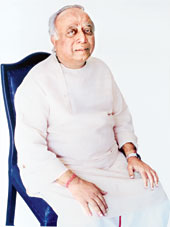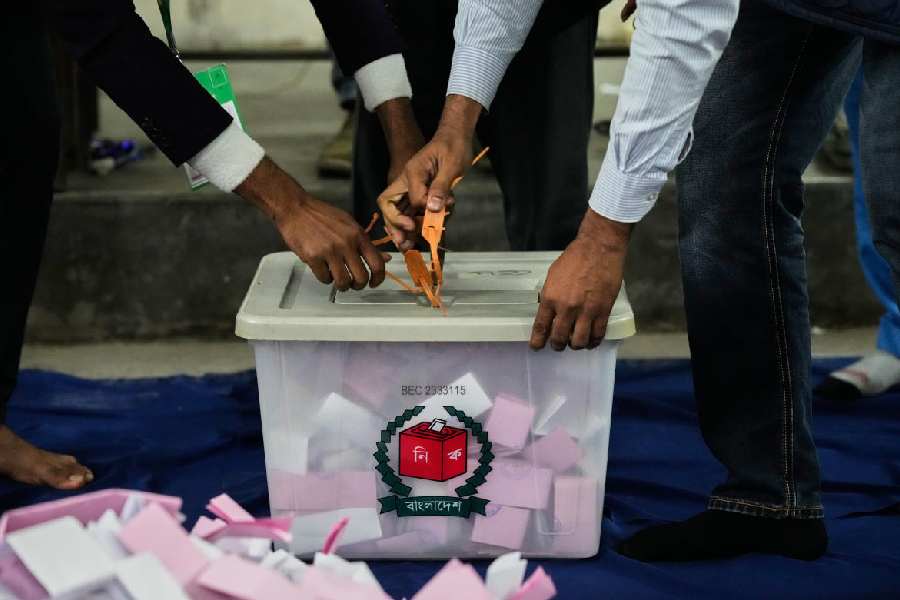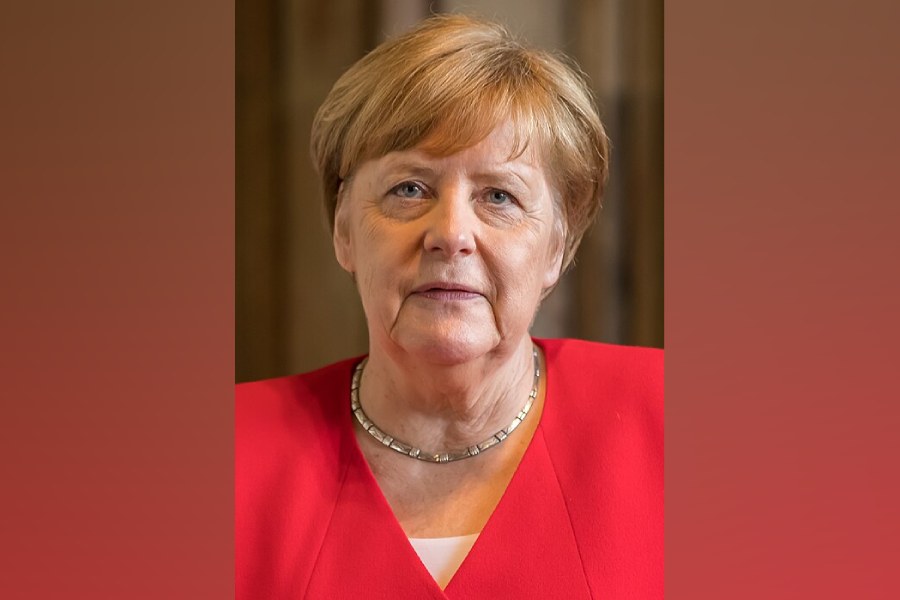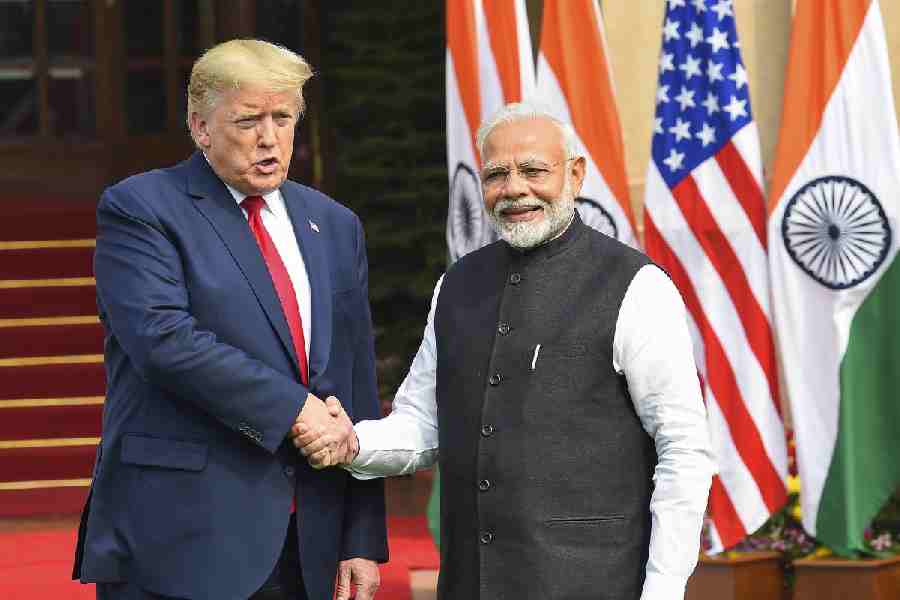 |
| Rama Prasad Goenka |
Calcutta, April 14: Rama Prasad Goenka, who died here today at the age of 83, was arguably India’s first home-grown takeover tycoon. Turned out almost always in a dhuti and panjabi, he remained committed till the end to Bengal, which saw an exodus of businessmen in his lifetime.
RPG passed away after a prolonged illness at his Alipore residence, Goenka Niwas, leaving behind wife Sushila and two sons, Harsh Vardhan and Sanjiv.
Born in Calcutta in 1930 into an established business family, Ramababu, as he was affectionately called in Indian business circles, studied history at Presidency College and then went to Harvard University where he completed its advanced management programme.
On returning to Calcutta, he started work as a covenanted assistant at Duncan Brothers at a princely salary of Rs 350 a month. But soon after, he joined the family business, which was then run by his father Keshav. It had been founded in 1820 by Ramdutt Goenka, who came from Rajasthan to do business with the East India Company.
The family business scaled new heights when Badridas Goenka, RPG’s grandfather, was conferred a knighthood by the British for his outstanding contribution to business. At the time, the Goenkas operated in areas like textiles, jute and tea.
After Independence, Keshav Goenka quickly snapped up a couple of businesses their British owners had sold off before heading back to Old Blighty — a canny art that RPG would later display while acquiring faltering businesses and turning them around.
Keshav acquired two British firms — Duncan Brothers and Octavius Steel — with the former shaping the identity of the Goenkas. He then made successful acquisitions in tea, automobiles, tyre, jute, cotton textile and electric cables.
By the early 1970s, Keshav had passed on the baton to his three sons — and RPG started assiduously building an empire that sprawled businesses from tyres and tea plantations to electricity distribution and bio-pharmaceuticals.
Ramababu’s first big takeover opportunity appeared in 1971 when Neville Wadia — father of Nusli — suddenly decided that he had had enough of India and its capricious regulations that stifled the business environment and wanted to head to Switzerland after selling textile giant Bombay Dyeing. Aware that the 26-year-old Nusli would oppose his decision to sell the textile company, Neville had carried out the negotiations with RPG in secret. A deal was drawn up by the solicitor firm Mulla and Mulla.
When the news broke, Nusli went ballistic. He scrambled for support to head off the takeover and found a willing ally in J.R.D. Tata. Using money from family and friends, Nusli quickly acquired 11 per cent of Bombay Dyeing shares and headed to London for an angry confrontation with his father, challenging his unilateral decision to sell the company.
Nusli and Tata quickly neutralised Neville and persuaded Ramababu to call off the deal. It was probably the only time in his life that the great takeover artist backed off — a decision that rankled for the rest of his life.
He never let on why he didn’t square off for a full-scale battle with Nusli after the deal had been signed and delivered. He once said the contract with Neville Wadia had never been torn up and had been kept as a souvenir in the care of the solicitor firm.
By the end of the 1970s, the Goenka brothers had separated. Keshav’s youngest son Gauri Prasad got the coveted Duncan Brothers, prompting RPG to create his own identity — RPG Enterprises — with Phillips Carbon Black, Asian Cables, Agarpara Jute and Murphy India as its constituents.
After the family split, there was a blizzard of acquisitions in the eighties. Some were successful, others less so.
Tyre maker Ceat was snapped up in 1981 followed by cable maker KEC in 1982, Searle India (now RPG Life Sciences) in 1983 and Dunlop in 1984. He also acquired the Gramophone Company of India Ltd (now Saregama India) in 1986 and finally CESC, the power generator, which had the licence to supply electricity in Calcutta and Howrah.
Even as he was establishing his reputation as a takeover and turnaround artist, he teamed up with a brash, nouveau riche non-resident Indian businessman —Manu Rajaram Chhabria — to acquire Dunlop.
At one time, RPG had publicly referred to Chhabria as his third son — but soon the dissensions began and they started to drift apart. Eventually, RPG sold his stake in Dunlop to Chhabria, convinced that they could not do business together.
The Dunlop misadventure did not dampen his zest for acquisitions and he made a play for CESC at the insistence of younger son Sanjiv, who was given the remit to run it. CESC proved one of his best takeover bets and more than compensated for the anguish of having to cede control of Dunlop.
RPG loved Calcutta and chose to live in the city when other industrialists deserted it in droves. The decision to stay on may have blunted business opportunities and ambition but he wasn’t prepared to trade in 200 years of his family’s deep-rooted connections with the city for the lure of the lucre.
Not many know that he was a voracious reader of Bengali novels, was fastidious about the way he wore the dhuti-Panjabi in the true Bengali style, and had effortlessly imbibed the culture of the bhadralok. He once famously remarked: “If I am not a Bengali, then who is?”
He did have a few regrets: he rued being forced to sell his 79 per cent stake in RPG Cellular, his telecom venture in Chennai, to C. Sivasankaran in 2003 because he needed the money to bail out a group finance entity. He was also unhappy that he hadn’t entered two lucrative business spaces: coal mining and petroleum refining.
By the early 1990s, RPG had retired from active corporate life, leaving his two sons to run the various businesses. Harsh Vardhan became chairman of RPG Enterprises and Sanjiv its vice-chairman.
RPG had the foresight to resolve succession issues between his sons, keen to avoid the acrimony that enveloped many business families after the death of their patriarch. In 2010 — amid reports of failing health — he carved out the business empire between his two sons, just as his father had done more than three decades ago.
RPG was close to Indira Gandhi and his support for her cause never wavered even after she lost the elections in 1977. It presented her opponents with the opportunity to throw him into prison for a day in Nainital soon after the Congress debacle.
He was also close to the late Jyoti Basu though things hadn’t been hunky-dory all along. Basu had initially opposed his involvement in the acquisition of Dunlop and had even written to Indira Gandhi urging her to stall approvals as RPG already controlled Ceat, which would give him a virtual monopoly over the tyre business.
Basu was also cool to the idea of RPG acquiring CESC, which later became the crown jewel of the Goenka business empire.
But relations between them thawed and RPG was an early-bird investor in Haldia Petrochemicals, Basu’s pet project through which he wanted to resurrect Bengal’s lost decade of industrialisation. But RPG soon made way for the Tatas when Basu brought them into the project.
A former president of the Federation of Indian Chambers of Commerce and Industry, Goenka was a trustee of the Jawaharlal Nehru Memorial Fund, the Indira Gandhi Memorial Trust and the Rajiv Gandhi Foundation. He was also chairman of the board of governors of the Indian Institute of Technology at Kharagpur.











